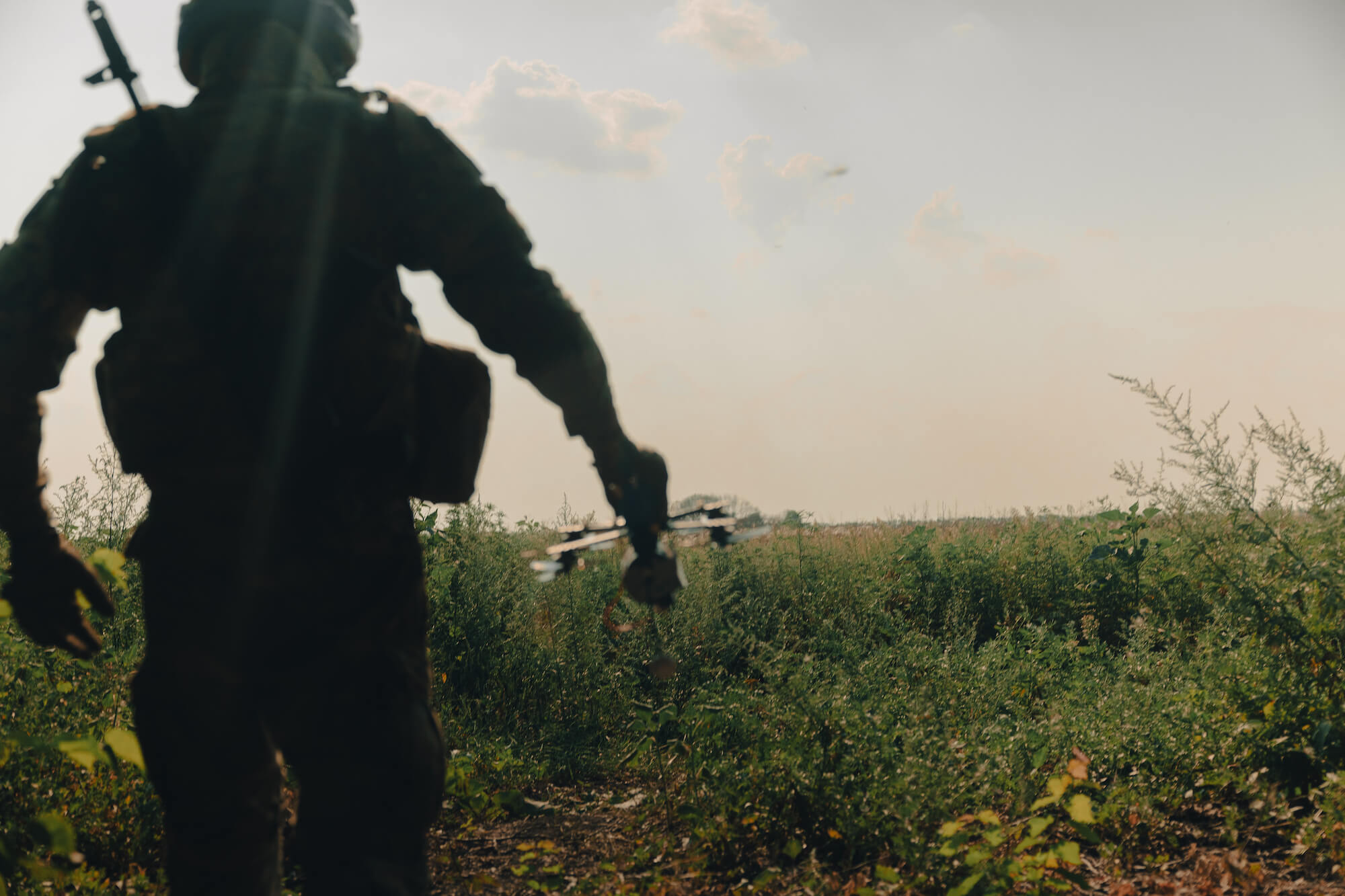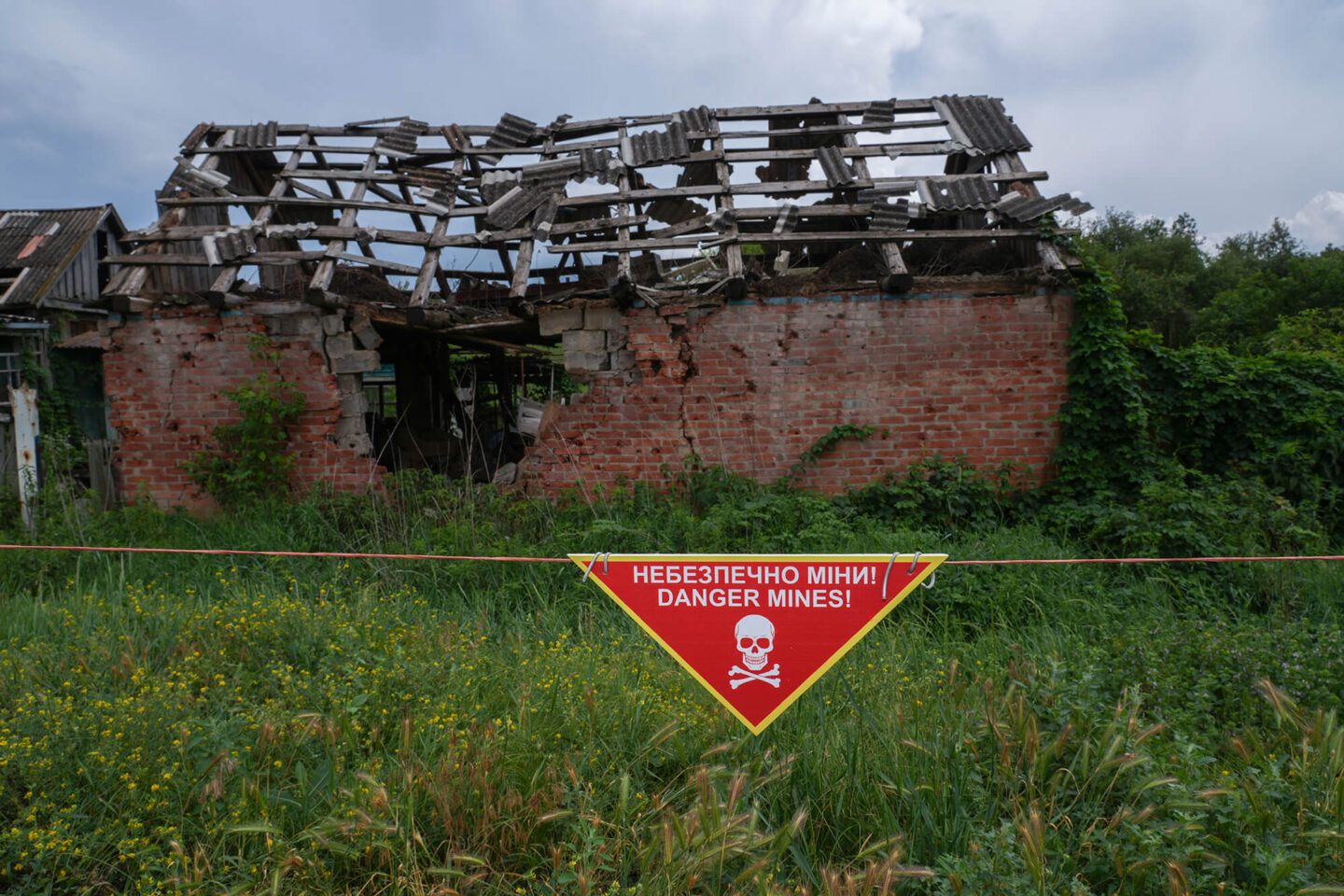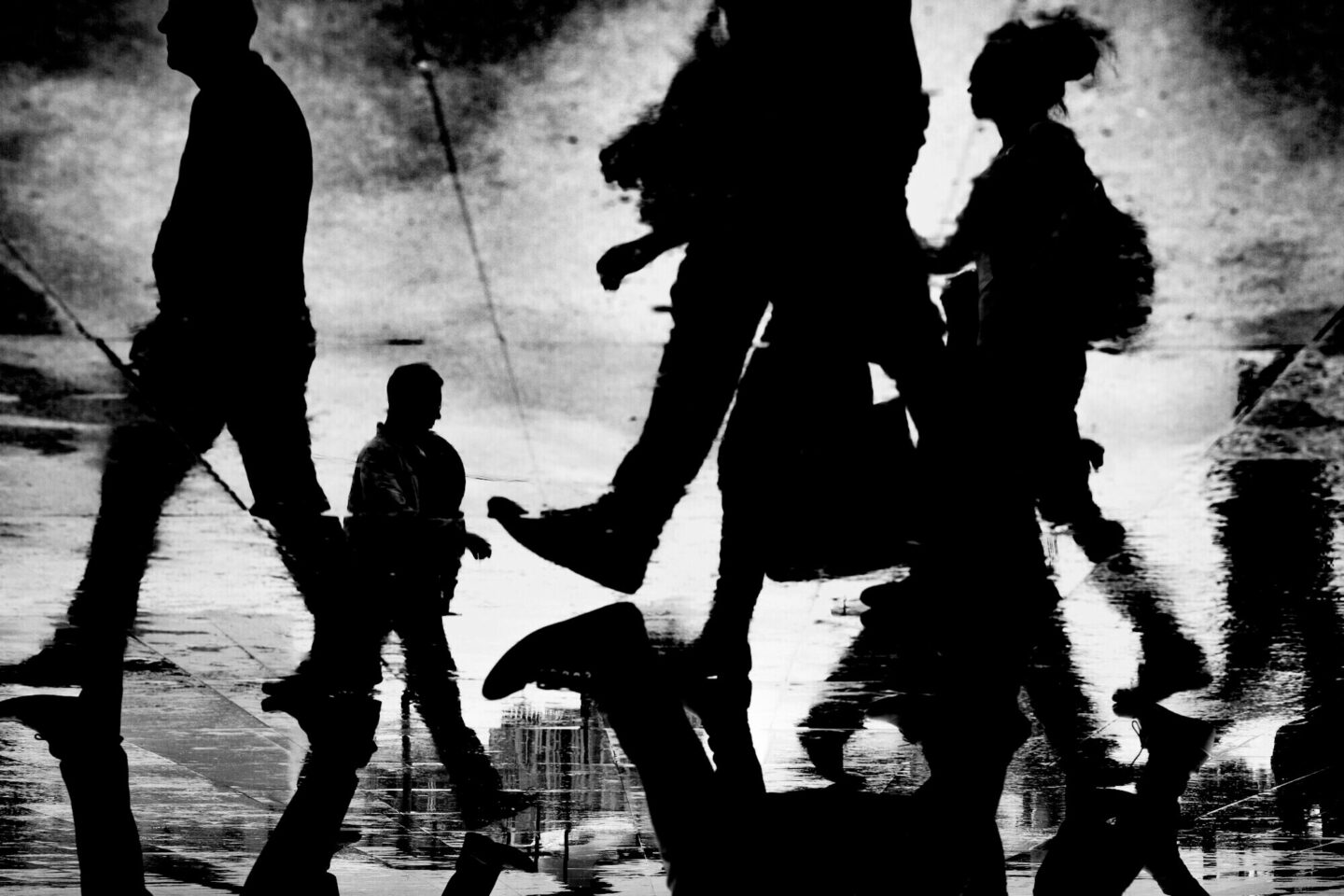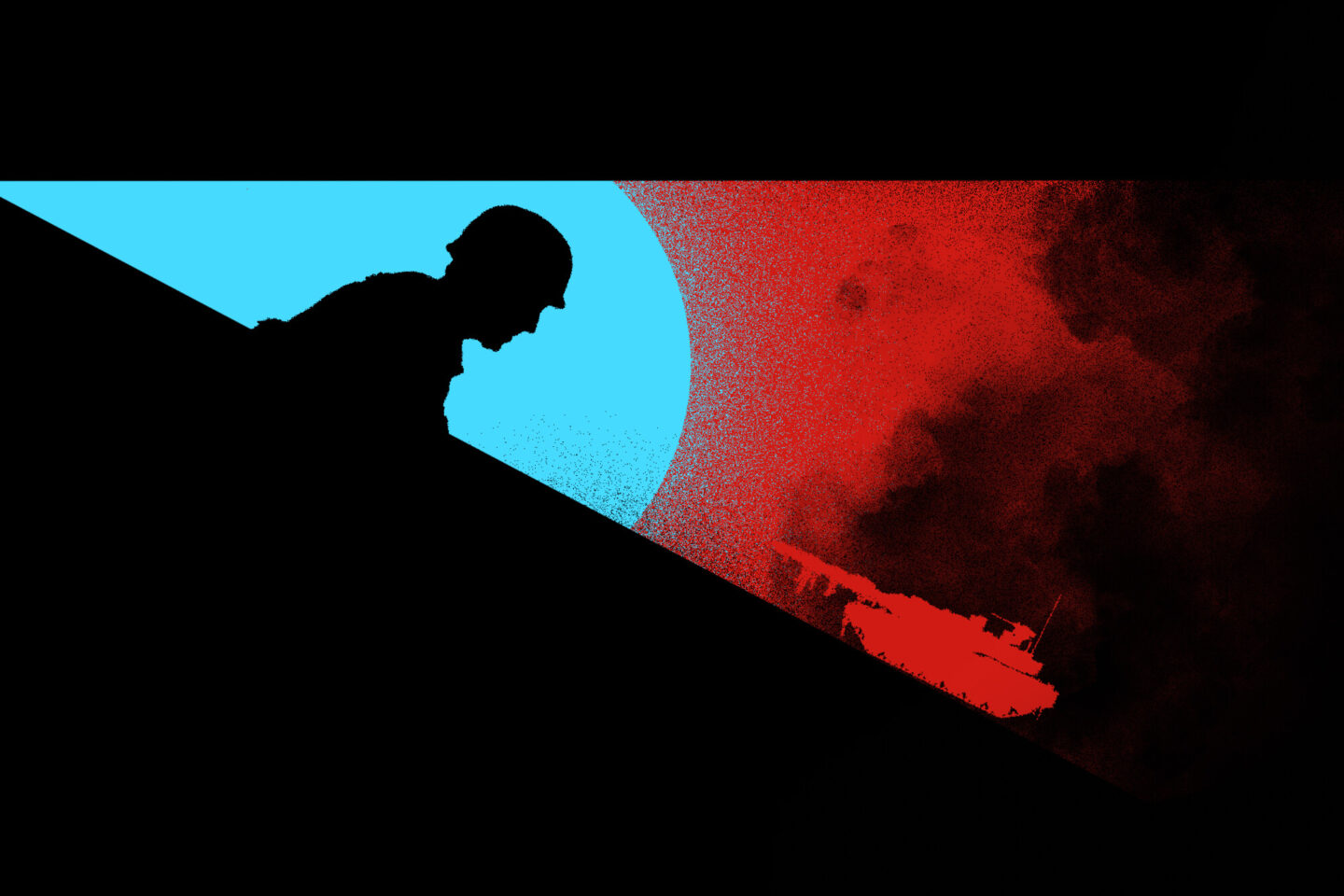One night around 2 a.m., I was lying on a rough wooden bunk in a damp dugout and caught myself thinking that I like where I am now, who I am with now, and what we are doing now.
This place is new to us, but others have been here before. You can tell from the soot in the corrugated pipe that catches fire at the first spark, the dusty debris, the writing on the walls, and the dirt that crumbled from the ceiling and walls.
Our latest “favorite” dugout, in this now all-too-dear forest belt, was left behind. For days, a “120-millimeter” has been taking it apart. There have been so many “dear” forest belts and “favorite” dugouts and cellars that no one keeps count. Every now and then, in casual conversations about the past, we recall, “Remember, how in Orlivka…?” or “And that time Solomon ran the forest belt’s HOA?” and so on. There have been many such places, and there will be many more.
I was lying in my favorite sleeping bag, zipped up almost to my neck, listening to the creaking radio chatter about detected targets, coordinating strikes on them, and realizing: I love what I do.
It’s exhausting, dirty (my hair is full of dirt right now), and there’s no routine for sleep or food. You sleep when you can. You eat when you have time and feel like it. Sometimes it’s stressful. Sometimes it’s fun to the point of tears. Sometimes it’s thrilling, and sometimes you have to do it despite anger and frustration.
But this is the challenge of my generation, and I enjoy taking it on and sometimes doing more than I expected from myself.
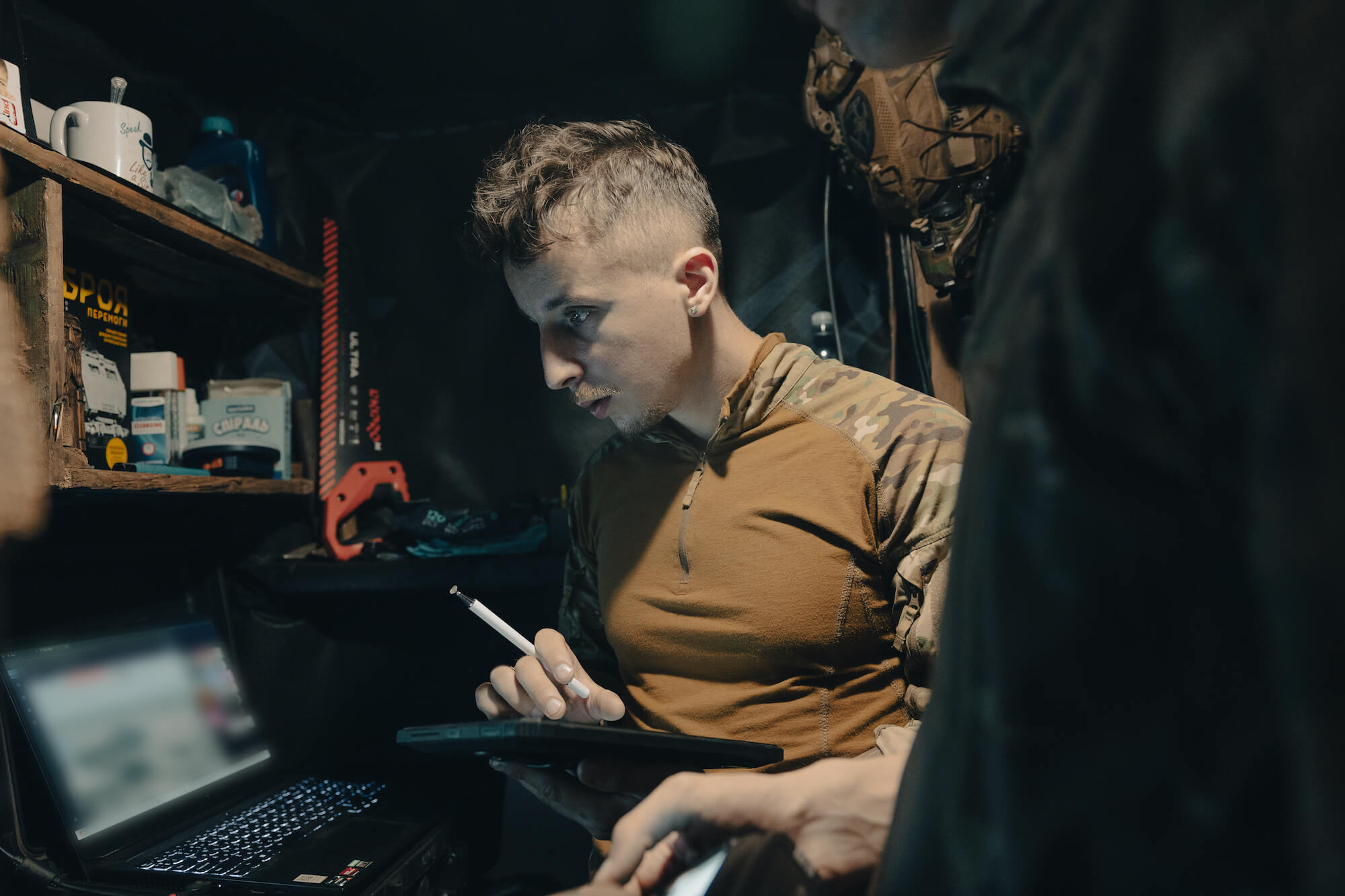
***
March 2024. After a special mission and heavy fighting in Avdiivka, our unit was relocated once again to another section of the front lines. This time, it’s Kharkiv Oblast, liberated but still scarred with wounds and graves.
It’s been a year and a half since Ukrainian soldiers drove the Russian troops out of here. But the destroyed cities and completely obliterated villages—many lifeless—remain. Burnt and shattered tree lines follow you almost everywhere, many still unable to grow green again.
With each move, it’s not just the area of combat operations that changes. You start from scratch, learning the maps and geography of the areas where you’ll fight and live. The place we’ll often refer to as “Are you heading home now?”
This unreal home, for months or maybe even years to come. You never really know for how long exactly. Because no one knows how long the war will last, or if all of us will make it to the next move.
You start figuring out where to buy groceries. Where to fill up on fuel that won’t ruin the engine. Where to get your vehicle fixed without paying a fortune—and not with duct tape and a sledgehammer. You try to understand how logistics work, not just for the mission, but for life. Because, like it or not, you live here and now, having left behind the past and setting aside dreams of another future until bedtime.
***
Before each move, a recon group is formed to scout the area. These are like our own Columbuses, skilled at discovering and exploring new places. It’s the recon that identifies that long-abandoned building, the one we’ll soon refer to as “home.”
In the first days, you find yourself blocked by a bridge that’s fallen into the water and look for a road that’ll take you to where you need to go. Or your GPS takes you an hour out of your way when there’s actually a bridge just a bit to the right—a bridge where, every two months, they even replace the boards. You watch the workers in reflective vests, tools in hand, and realize that life goes on, right here, right now.
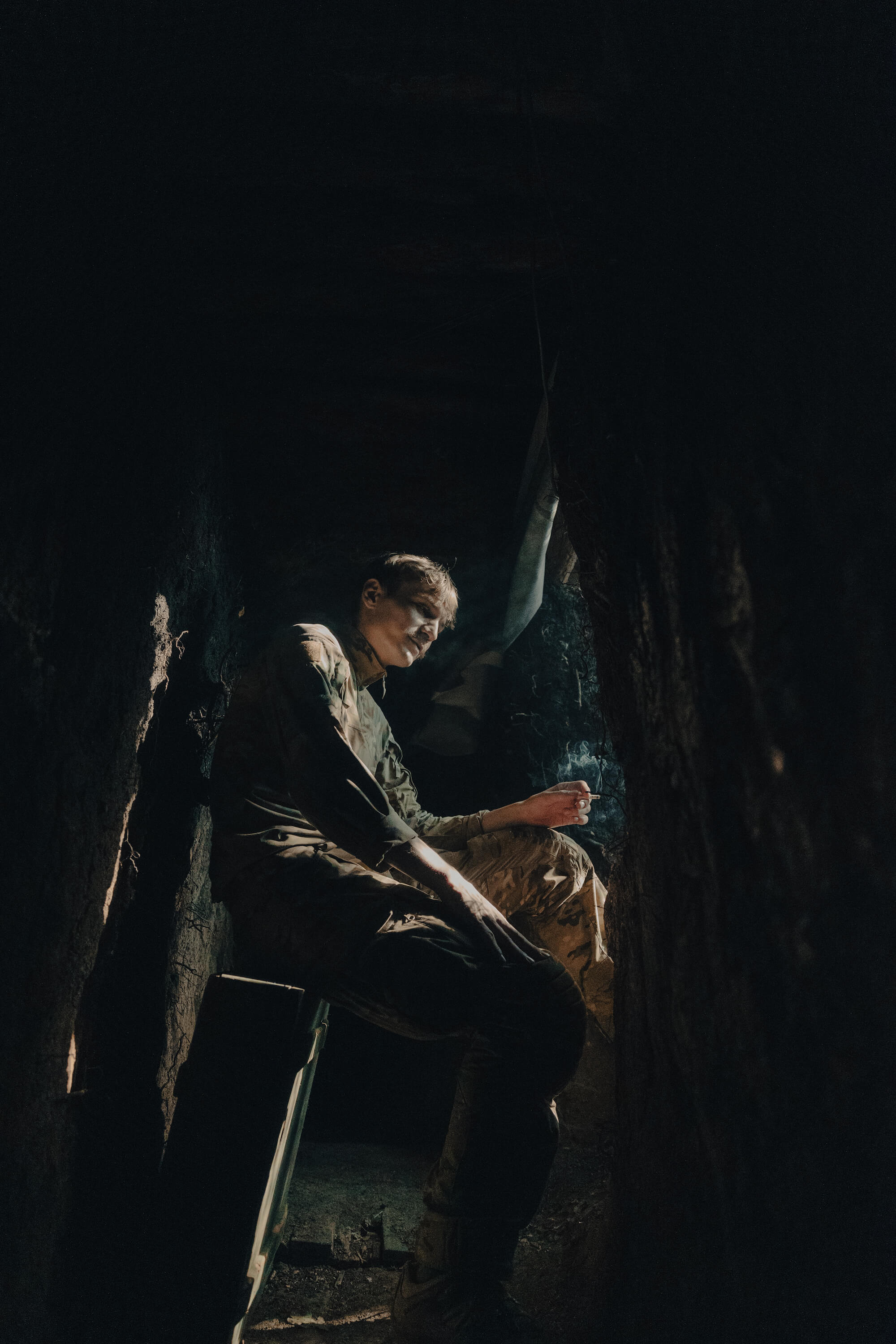
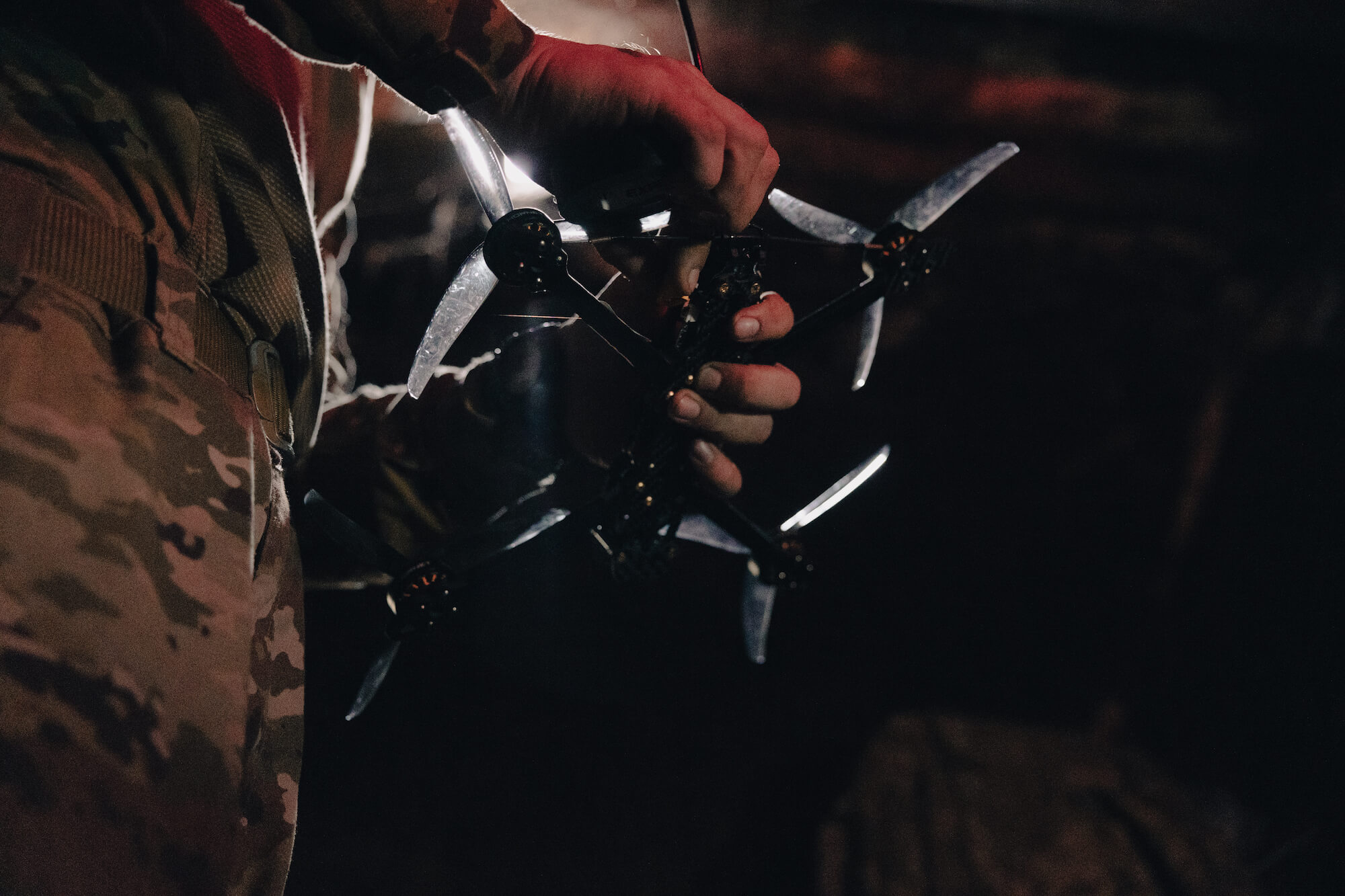
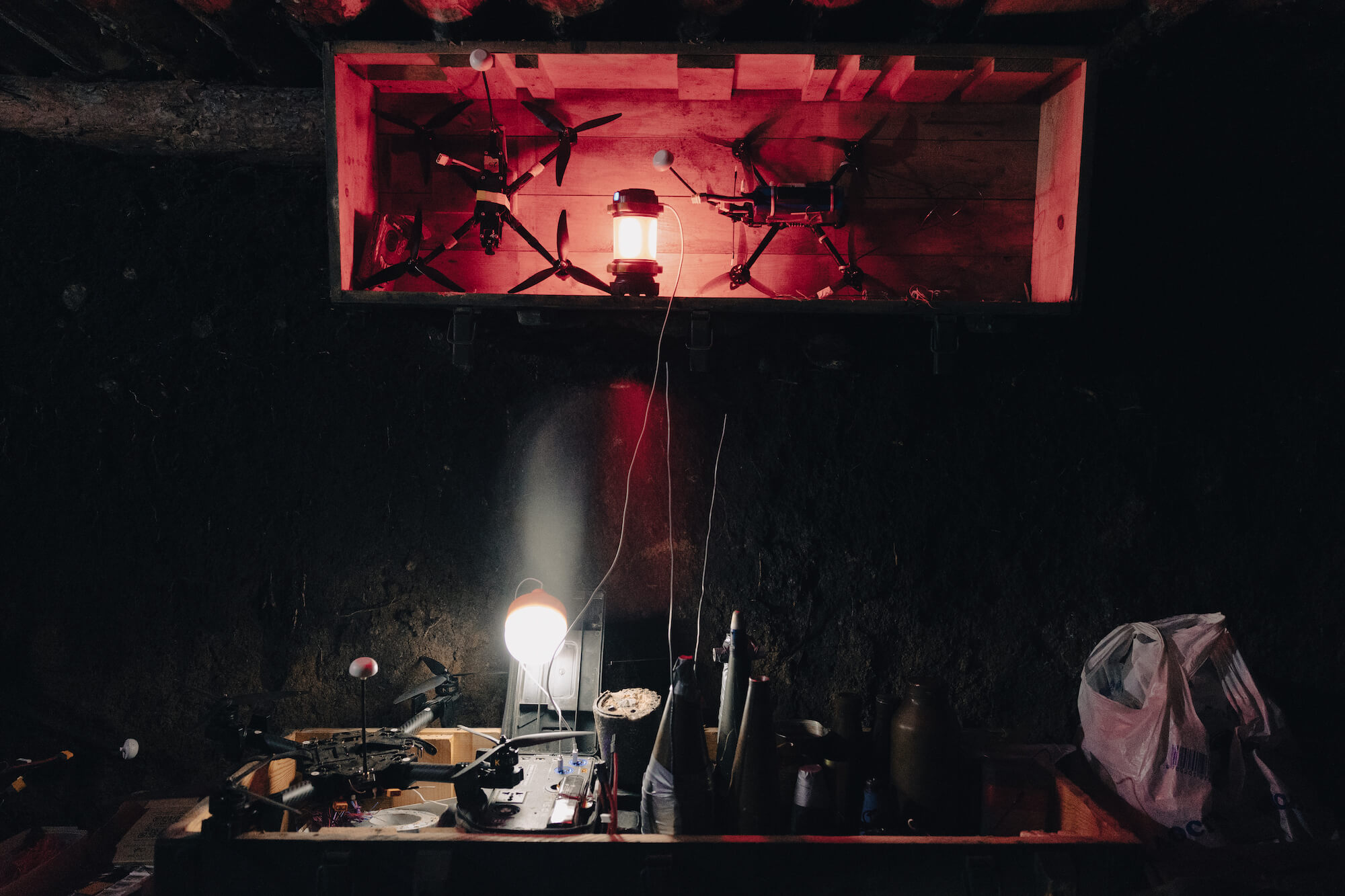
At first, it’s hard. The change is overwhelming, as is the lack of comfort. In rare moments of free time, I get in the car and drive around to scout the nearby rivers, lakes, and places where I can be alone, breathe in the beauty of nature, listen to it, recharge, and move forward.
In our new “home,” no one has lived for a long time. There’s a strange hospital smell, though it’s not a hospital. Dust covers everything in layers. There’s no water, no working plumbing, no electricity. But there’s a place to set up a cot with a sleeping bag. Everything else is just a matter of time.
***
Over time, your hovel turns into a cozy den: with strange, easy-to-assemble furniture from the internet and string lights on the walls, like on the terraces of restaurants in Zaporizhzhia. We all pitch in to buy new plumbing. Eventually, we even get a vacuum cleaner, a fridge, and a shower. Even our own table with a scented candle.
The pile of camo bags fades into the background. Gear and equipment find their place on stands and shelves we never dreamed of having here in the early days.
At first, you don’t even want to peek here. But later, after all the effort, there comes a moment when little pieces of your real home, the one you feel in your soul, start to appear.
By my bed are my wife’s little red slippers, which she wears when she visits. I don’t put them away after she leaves. They stay in their place, waiting for the day when we’ll both leave this bed together.
Hanging on the exercise bar is a white t-shirt, a gift from my wife. We have two identical ones. And while the others are folded in the closet, this one stays here, by my side. I want to see it and wear it on our next trip, during our vacation.
On a wooden stool, along with other important things, stands a quirky phone stand. It was also a gift from my wife, with hugging little kittens on it from our favorite stickers in Signal.
There’s also a small figure of Odin, whose image is tattooed on my arm, a family photo, and a book that has a whole chapter written about us.
Just half a meter away, my body armor and weapons hang neatly, waiting for the next night. When I’ll gear up, sit on the bed, kiss my wife’s photo, and head out again to add to the statistics of destroyed enemies of the Ukrainian nation.
***
You coordinate, destroy, dig. You brew tea, take down an enemy bunker, laugh, order flowers for your wife, eat a sandwich wrapped in foil, take out the next target. You watch as an enemy soldier stumbles away, missing a leg. You write a report about hitting a hideout with a fougasse. You fall silent and instinctively duck your head slightly, along with everyone else, when a round lands nearby. You speed down the road in a right-hand-drive car, peering through night vision goggles into the night. You have no idea what day of the week it is, what the date is, or that people can have weekends off.
Life here will leave our descendants exhausted just from hearing about it. So many lives have ended here and will continue to end, just so that our descendants can be born and hear true stories about us.
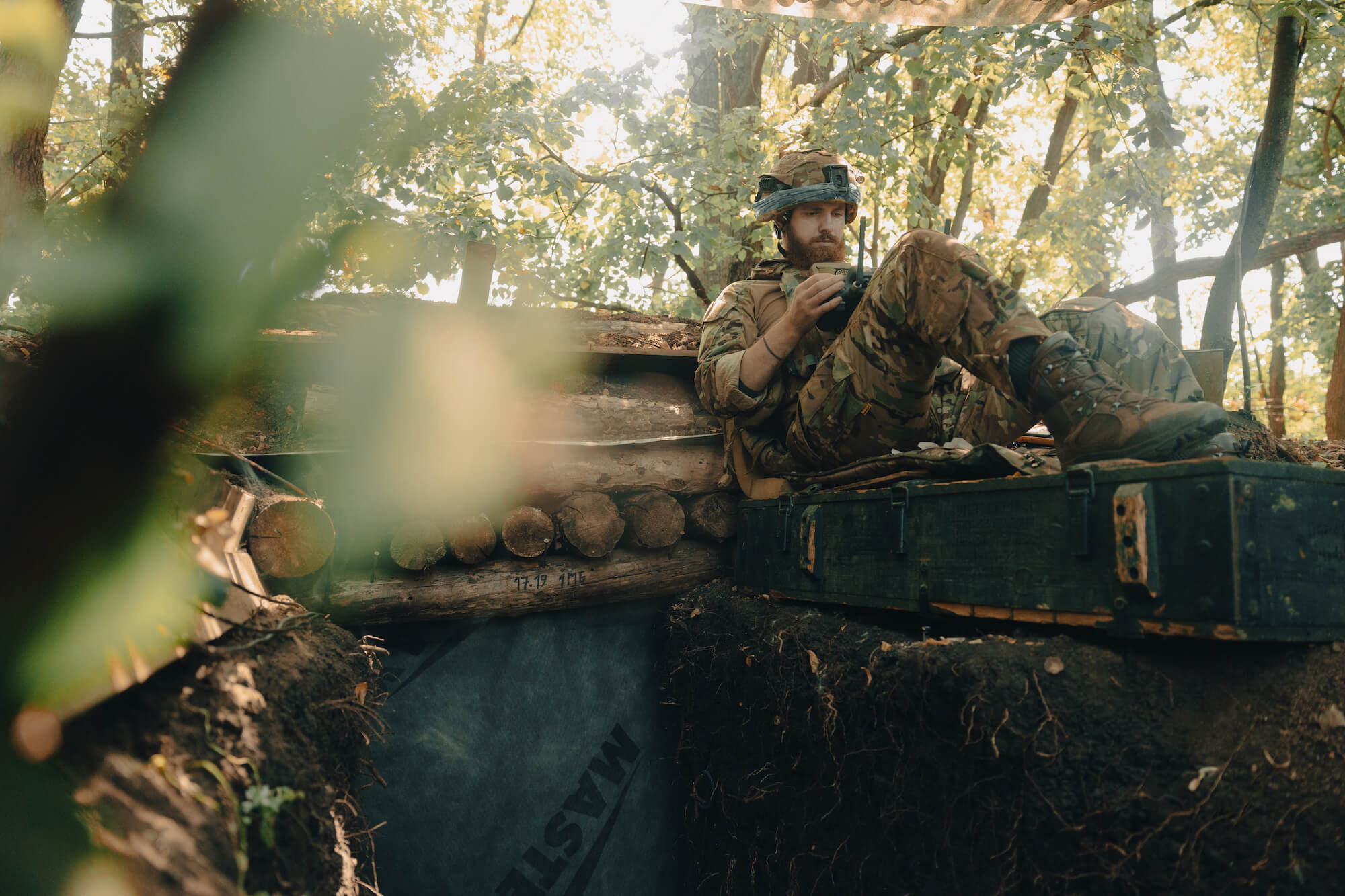
***
Here, we load up in the dark into our battle-scarred vehicle, which has seen the mechanic more often than I’ve seen the dentist. The trunk is a testament to all our childhood experience playing Tetris. We get into the car, slam the doors, and go through the checklist to make sure we’ve got everything.
I lower my night vision goggles onto my eyes and drive out of the forest onto the dirt road, then lift the goggles again because the forest ahead is on fire from the day’s shelling, and I can’t see anything through them. I switch on the night vision camera screen, flying down the road, swerving right to avoid a crater left by a shell.
We talk, laugh. We remember the day. We talk a lot about our upcoming leave—who will do what and where. We repeat ourselves a lot, but no one minds. These conversations are full of life. A bit farther away, at a safe distance, I blast out Nuwisan’s “Loser.”
In these conversations. In these dugouts. Among these people. In this war. In this life and death—I love what I do. And I like being here. I see meaning and purpose in it all. I can’t imagine abandoning it. How could I leave this for a civilian job, a carefree life—while here, on the front lines, there’s more than enough to care about for everyone in this country?
But there’s one thing I miss: my beloved wife, who I’m insanely longing for, and in whose honor I do all this. Let fate throw any challenge my way, as long as afterward I get the chance to hug her more often and feel the warmth of her hands.
I often think how wonderful it would be to come back from a combat mission, open the door to our home, and catch my wife in my arms. To cook dinner for us both. To tell each other about our day. Then go back to our important work.
You dream of it. But you’re clear about reality. The front needs to stay here, as far from home as possible. So there is a home. So there is us. So there are these dreams. So these dreams have a chance to come true.
For that, I need to be here. To be a part of this great resistance machine. To be strong and committed. A cog that works at full capacity at its level, where the success of all depends on each person’s role. And today, this is my role.
***
Then another relocation order comes. Those of us who are still alive will gather our things, vacate the well-settled and now comfortable place, and move on to the next. Off to start all over again, for who knows how many times now, in another part of the front.
You might think that at such moments, deep down, a sadness tries to bore a hole and break through. That, maybe, you’d regret your efforts.
But in reality, you see it as a new challenge from fate. The venture of war reminds you of its presence. The time spent here will be recorded in memories, in emotional conversations with all sorts of different emotions. The key is to keep living and to love what you’re doing. For yourself, for everyone.
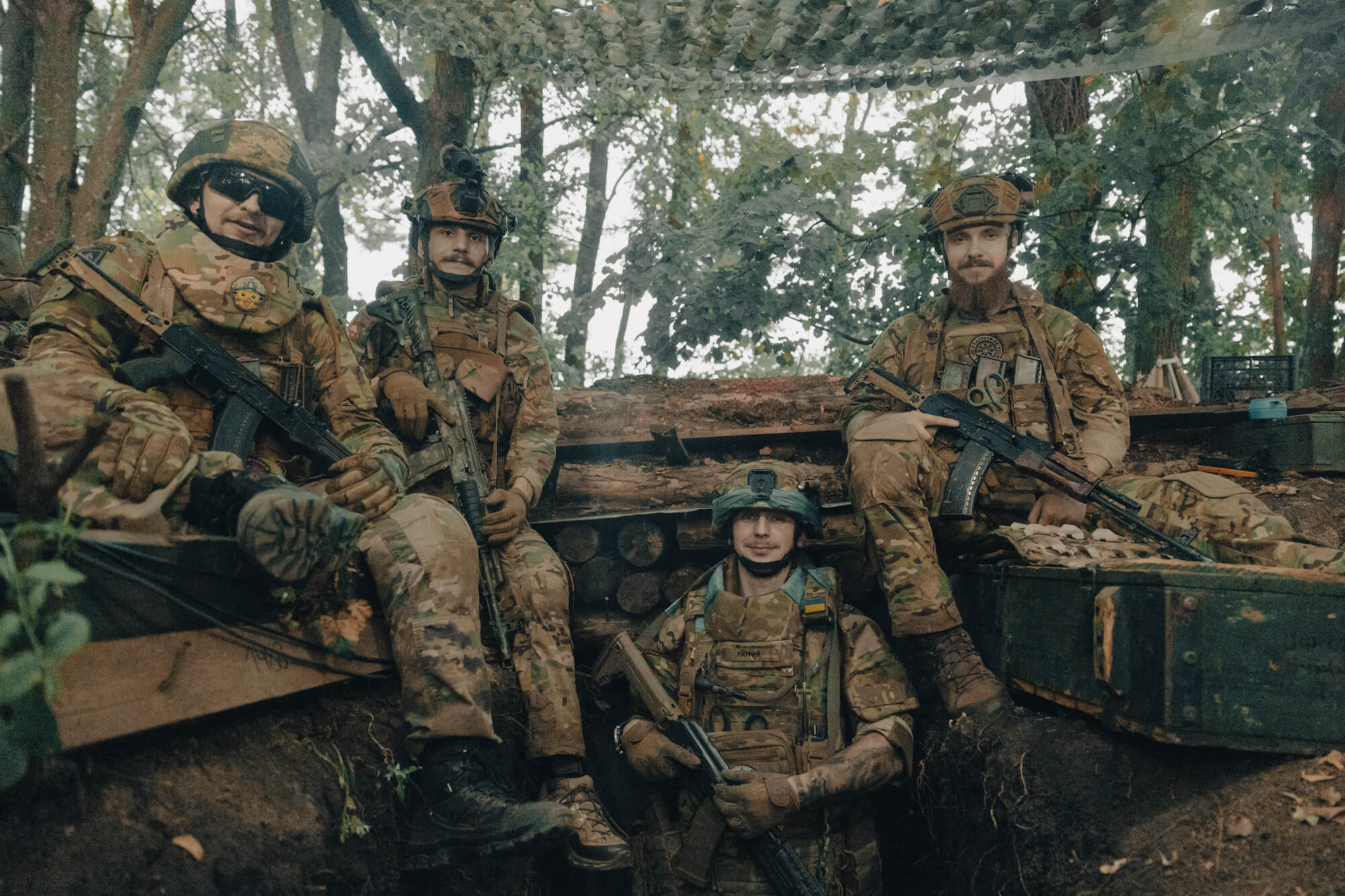
Once, near the building where we were staying, there was an abandoned flower bed. Flowers must have grown there at some point, and someone had tended to them. But now, weeds had taken over, the ground was torn up by shell impacts, and the trees had long been neglected. Every time I went outside, my eyes landed on that spot. It was as if it was asking to be freed, to be brought back to life that was once there—and could still be.
Over the next week, I spent all my free time trying to restore the neglected area. I dug up and sifted through the soil, clearing it of glass, stones, and weeds. I gave strength to the tree by trimming away old, dried, or excess branches. I bought flower sprouts from local grannies at the market and transplanted the ones that had been struggling to survive. At first, the locals couldn’t understand what was going on, but soon they couldn’t walk by without saying something kind.
My comrades looked at me with surprise, but they supported and praised me. Once, while I was digging in the dirt again, a man in his fifties, dressed in dirty camo pants and a t-shirt, approached. He took a drag on his cigarette, looked at me with a mix of confusion and disapproval, and asked, “Why bother? No one’s going to thank you.”
I looked up, straightened up, shirtless with hands black from the soil, and met his eyes. “Why can’t we do something just because? For ourselves, for those around us? Just to make it beautiful? This is our land.”
There was no response. Just a glassy stare and a slow walk toward “his” porch, where a tin can full of cigarette butts and a bush stood two meters away. He sat down, lit up, and carried on with his life.
Months passed. The flowers grew and bloomed. The trees found the strength to turn green, blossom, and bear fruit. I was sitting in my parked car across the street, looking at something on my phone, invisible through the tinted windows.
A little girl, about seven years old, was walking with her mom nearby. She saw the flowers, ran up, squatted down, and started smelling a white bloom, laughing. She touched the flowers with her tiny fingers and asked her mom to take a picture of her next to them.
I was still sitting in the car, watching as white, pink, and purple flowers grew in front of a gray wall scarred by shrapnel. I watched as someone’s wife photographed her smiling little daughter. I sat there, also smiling and a bit crying.
At that moment, just like today, I knew what I wanted, who and what I was living for, and why. And I don’t mind living this life, no matter how hard it is. Because everything done with love has meaning.

Text by: Bohdan Tyshchenko, FPV Drone Operator, 3rd Separate Assault Brigade
Photos by: Yara, Photographer, 3rd Separate Assault Brigade
Translation — Iryna Chalapchii
§§§
[The translation of this publication was compiled with the support of the European Union and the International Renaissance Foundation within the framework “European Renaissance of Ukraine” project. Its content is the exclusive responsibility of the authors and does not necessarily reflect the views of the European Union and the International Renaissance Foundation]

